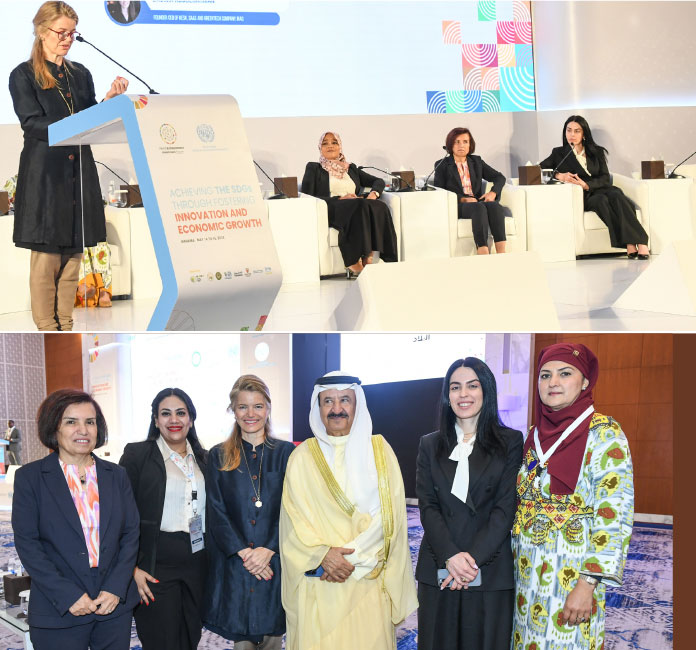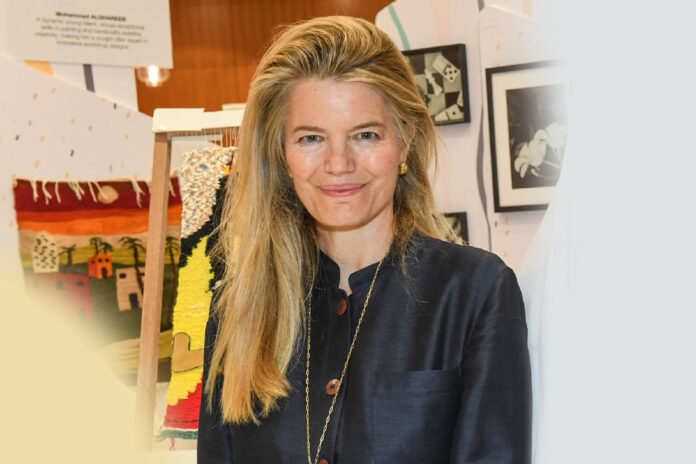Sophia Swire, the visionary founder of Gender Equity Diversity Investments (GEDI), recently attended the United Nations Industrial Development Organisation (UNIDO) forum in Bahrain. Swire’s career, spanning from banking to ground-breaking social initiatives, reflects her unwavering commitment to gender equity and education. In this exclusive interview with Farah Baig, she offers enlightening insight into her motivations, challenges and aspirations, offering a compelling narrative of her life’s work dedicated to uplifting women in conflict-affected regions.
Ms. Swire, you had a very successful career in banking initially. What drove you to leave your career and pursue social change?
After the stock market crash of 1987, which was the biggest since 1929, the atmosphere in the finance sector became extremely cutthroat. My boss at the time, who was meant to be protecting and mentoring me, even threatened to take my top clients to save his job, which felt deeply unjust. During this challenging period, I felt a compelling urge to find work that had more meaning and impact, beyond the bottom line of making money. This was the era of ‘greed is good,’ but I longed for a life that contributed positively to society. So, I listened to the virtual bird on my shoulder and decided to become an aid worker or a war correspondent, leading me to the Hindu Kush and ultimately to establishing 200 schools across Afghanistan, Pakistan and India.
Why did you choose education as your primary focus?
When I first went out to the region in September 1988 on my reconnaissance trip to Peshawar, I ended up going trekking in the Hindu Kush with some friends of mine to this absolutely beautiful former principality called Chitral. It was landlocked by snow for eight months of the year, impossible to get in or out except by air. The weather meant that people were sometimes isolated for weeks at a time so inevitably it was considered a backwater, both culturally and economically. It couldn’t attract the top teachers, engineers, lawyers and so forth, and there was just two percent female literacy.
I arrived on my 25th birthday and the local Deputy Commissioner tapped me on the shoulder and asked for my help to set up a school, which felt like fate. With the help of my friends and resources from London, we established a school that became a beacon of change. Witnessing the transformative power of education, especially for girls, reinforced my belief that education is the silver bullet for economic and social development. Over the years, we’ve seen literacy rates improve significantly, to a high of 30 percent now, which in turn reduced infant and maternal mortality rates due to better access to female healthcare professionals.
 Following the co-founding of Learning for Life, you also founded Future Brilliance, which offered workplace skills for Afghan women. Can you tell us more about that initiative?
Following the co-founding of Learning for Life, you also founded Future Brilliance, which offered workplace skills for Afghan women. Can you tell us more about that initiative?
Between my educational projects, I started a successful pashmina business, working with female artisans in Nepal during the Maoist uprising. This venture allowed women to work from home, improving their economic conditions and enabling them to send their children to school. This experience taught me the value of empowering women through enterprise. Turquoise Mountain asked me to establish a jewellery school in 2008 to train Afghan women in jewellery making and other skills. Future Brilliance was started in 2012 with the support of the US Department of Defense’s Task Force for Business and Stability Operations. We provided highlevel training in Jaipur and placed these women in top workshops, significantly improving their economic prospects and community stability. They took those skills back to Afghanistan and they brought them to their villages, transforming the aspirations, hopes and economic outlook for remote rural villages.
Given the recent changes in Afghanistan, how have these initiatives adapted, and what are your hopes for them moving forward?
Despite the challenges, many artisans we trained remain in Afghanistan and continue their work. Interestingly, the Taliban government has formalised artisanal mining and reduced tax rates to two percent down from the 15 percent of the previous government, making it a more viable business. Although education for girls has faced setbacks, the Taliban has recognised the need for female healthcare workers. We are developing an AI-powered learning solution to bridge the educational gap for girls, especially in nursing and midwifery. This hybrid solution aims to provide top-tier education despite the current restrictions.
You’ve also been passionate about supporting female entrepreneurs globally. Can you share more about your work with GEDI?
GEDI focuses on harnessing private sector investment to support ambitious women-led businesses. Globally, only two percent of venture capital funding goes to female founders, which is unacceptable. In the MENA region, the figure is even lower at a measly 0.47 percent. GEDI aims to change this by providing funding and support to women with game-changing ideas, particularly in STEM fields. Women have ideas for game-changing technologies that are good for the climate, good for people, good for nature, that are regenerative, sustainable and circular because women tend to be more planet-minded and people-minded. Our goal is to not only support these women for social good but also to ensure solid returns on investment, demonstrating that investing in women is both ethical and profitable.
Do you have a message for women wishing to drive the level of social change you have pursued?
Absolutely. First, build your confidence. Public speaking can be daunting, but it’s essential. Join groups like Toastmasters or your school’s debating society to overcome shyness. Second, collaborate and test your business ideas with professionals. Join venture studios or accelerators, ideally with women founders who understand your perspective. Third, tailor your presentations to the data-driven preferences of investors, who are often men.
Lastly, build a strong network. Everything I’ve achieved was with the support of a dedicated team. Raise an army of like-minded individuals who can support and amplify your mission.
Is there anything else you’d like to add?
We can do nothing alone. So everything I’ve ever done, things often quite astonishing under the circumstances, for instance, evacuating hundreds of Afghan people, raising hundreds of thousands of dollars virtually overnight, helping to charter a jet, moving people through checkpoints, setting up and running safe houses in Pakistan, none of these things I’d ever done before. And I was able to do it because it wasn’t just me, it was a team.
I led a team, I raised an army. So my advice is raise an army for whatever it is you’re trying to do. You know, we’re Jedi at GEDI, we’re light warriors and we’re an army of light bearing warriors for good! So my invitation to your readers is join our GEDI network. It will be an opportunity, if you have proficiency, to provide that expertise to female founders whom we eventually invest in and wish to scale.





